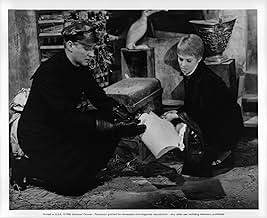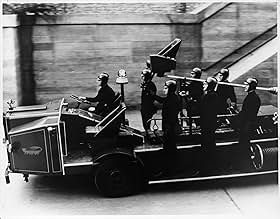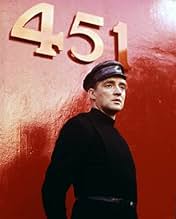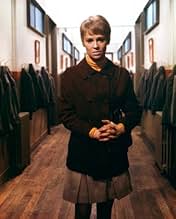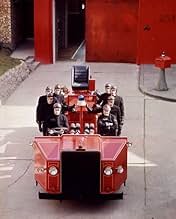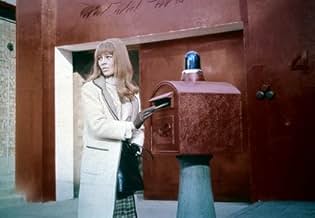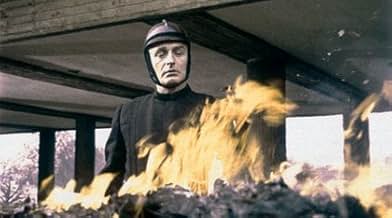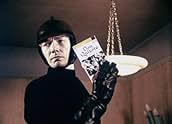Fahrenheit 451
- 1966
- Tous publics
- 1h 52m
IMDb RATING
7.2/10
47K
YOUR RATING
In an oppressive future, a fireman whose duty is to destroy all books begins to question his task.In an oppressive future, a fireman whose duty is to destroy all books begins to question his task.In an oppressive future, a fireman whose duty is to destroy all books begins to question his task.
- Nominated for 1 BAFTA Award
- 1 win & 4 nominations total
Gillian Aldam
- Judoka Woman
- (uncredited)
Alfie Bass
- Book Person: 'The Prince'
- (uncredited)
Yvonne Blake
- Book Person: 'The Jewish Question'
- (uncredited)
Arthur Cox
- Male Nurse
- (uncredited)
Frank Cox
- Book Person: 'Prejudice'
- (uncredited)
Fred Cox
- Book Person: 'Pride'
- (uncredited)
Noel Davis
- Cousin Midge - TV Personality
- (uncredited)
Judith Drinan
- Book Person - Plato's 'Republic'
- (uncredited)
Kevin Eldon
- Robert - First Schoolboy
- (uncredited)
Featured reviews
A film about the deliberate dumbing down and control of the populace using information control is perhaps more relevant than ever but Fahrenheit 451 also shows it's age in many parts and the conclusion doesn't feel right to my sensibilities.
Even so it's a story worth knowing and still an effective - though at times glacially paced - film.
The acting is passable. It follows the rather stilted form common at the time but it still conveys the story well and since the characters are supposed to be emotionless and controlled it's also fairly effective.
All in all I would recommend anyone to see it. It's not as impactful as 1984 but still a classic story that should be remembered.
Even so it's a story worth knowing and still an effective - though at times glacially paced - film.
The acting is passable. It follows the rather stilted form common at the time but it still conveys the story well and since the characters are supposed to be emotionless and controlled it's also fairly effective.
All in all I would recommend anyone to see it. It's not as impactful as 1984 but still a classic story that should be remembered.
Ray Bradbury's disturbing vision of a possible future comes vividly alive in this film adaption of Fahrenheit 451. Reading for pleasure is now banned although I imagine you must have a certain degree of literacy to read food can labels and directions to operate all kinds of machinery. But read for enjoyment or for education about the world beyond the small space of earth you frequent, that's a big no-no in this future America.
Oskar Werner stars in Fahrenheit 451, he plays a fireman who have a different function in this society. Buildings and such are now fireproof so fireman have become the enforcers of the ban against books. They seek and burn books in whatever quantities they find. A good job in a police state, but not a good one if you have an inquiring mind such as Werner has.
Julie Christie plays two roles, Werner's pleasure driven wife and a schoolteacher whose unorthodox for that society's teaching methods have brought her under scrutiny. She does a good job in both characterizations.
Bradbury's themes are grounded in reality. Looking at American history it was a crime in many slave holding states to educate a slave. Let them be happy in their ignorance and they might not get ideas about a better life and won't rebel.
But this is a society that's beyond that kind of formal slavery so the answer is the old Roman one of bread&circuses. The circus in this case is television which has evolved into an interactive medium. The vast wasteland that Newton Minow characterized television as back in the day has gone beyond anything Minow was having visions about. Entertainment has really dumbed down and the circuses aren't too far from what used to entertain the Romans.
In the supporting cast you will remember Cyril Cusack as the fire brigade captain who functions as the spokesman for this new world and Bee Duffring as the book lady who martyrs herself for knowledge in an unforgettable scene.
The ending is not Bradbury's, but one written by director Francois Truffaut. It is very much however in the spirit of the novel and a tribute to mankind's unquenchable thirst for knowledge. Don't miss Fahrenheit 451 when broadcast.
Oskar Werner stars in Fahrenheit 451, he plays a fireman who have a different function in this society. Buildings and such are now fireproof so fireman have become the enforcers of the ban against books. They seek and burn books in whatever quantities they find. A good job in a police state, but not a good one if you have an inquiring mind such as Werner has.
Julie Christie plays two roles, Werner's pleasure driven wife and a schoolteacher whose unorthodox for that society's teaching methods have brought her under scrutiny. She does a good job in both characterizations.
Bradbury's themes are grounded in reality. Looking at American history it was a crime in many slave holding states to educate a slave. Let them be happy in their ignorance and they might not get ideas about a better life and won't rebel.
But this is a society that's beyond that kind of formal slavery so the answer is the old Roman one of bread&circuses. The circus in this case is television which has evolved into an interactive medium. The vast wasteland that Newton Minow characterized television as back in the day has gone beyond anything Minow was having visions about. Entertainment has really dumbed down and the circuses aren't too far from what used to entertain the Romans.
In the supporting cast you will remember Cyril Cusack as the fire brigade captain who functions as the spokesman for this new world and Bee Duffring as the book lady who martyrs herself for knowledge in an unforgettable scene.
The ending is not Bradbury's, but one written by director Francois Truffaut. It is very much however in the spirit of the novel and a tribute to mankind's unquenchable thirst for knowledge. Don't miss Fahrenheit 451 when broadcast.
After reading several whinny comments about how the movie is so different from the book I just had to add my two cents. Hello people! These are two different mediums here, like comparing Katherine Hepburn to Audrey Hepburn. They are two different entities which stand alone on their own merits.
I read the book years and years ago, and frankly, I don't remember much about it. I'd seen the movie in years past, and it never knocked my socks off. But upon viewing it last night, I have to say I found myself thoroughly engrossed in it. The scene in the monorail where all the passengers are trying to stimulate themselves through their sense of touch is quite moving. As is the neighbor who declares, "They aren't like us, are they?"
It's never going to be a movie in which you want to see over and over again (like the fluffy Wizard of Oz, again a book that is totally different from the movie, where are the complaining people now?) but it's a movie that should be seen. I also wonder how many people will complain when the new version comes out? I can hear them now, "The first movie was so much better!"
I read the book years and years ago, and frankly, I don't remember much about it. I'd seen the movie in years past, and it never knocked my socks off. But upon viewing it last night, I have to say I found myself thoroughly engrossed in it. The scene in the monorail where all the passengers are trying to stimulate themselves through their sense of touch is quite moving. As is the neighbor who declares, "They aren't like us, are they?"
It's never going to be a movie in which you want to see over and over again (like the fluffy Wizard of Oz, again a book that is totally different from the movie, where are the complaining people now?) but it's a movie that should be seen. I also wonder how many people will complain when the new version comes out? I can hear them now, "The first movie was so much better!"
Go figure that I had the privilege of seeing "Fahrenheit 451," for free, on a big screen a few years back (an independent Illinois art house had gotten hold of what was allegedly one of the last surviving prints), and at the time hadn't the foggiest concept of how PRIVILEGED an event it was. Sitting in a theater crowded with college students on a budget with nothing better to do, I watched this diverting little retro item, appreciated its subtlety, nuance, bold visual style, and 'got' the message that if we're not careful, we'll be mindless drones having our desires dictated by The Tube (in current times, that's hardly a profound statement).
Francois Truffaut's adaptation of Ray Bradbury's novel is a bold visual feast that presents a time that might seem 'retrograde' in the eye of a modern pop-culture snob, but ultimately projects what a conceivable 'future' might look like (and not that CGI malarkey served up in "The Matrix"). Interiors of houses are awash in odd colors and give shelter to appliances that don't look dissimilar from our own; TV screens embedded in living-room walls play programs which vacuous housewives interact with sometimes. The film is so relentlessly confident in its appearance that it withstands the test of time.
Though if "Fahrenheit 451" only had its storybook style to rely on, it would fade and be filed away as a mere technical achievement. Truffaut, working from strong source material, concocts a riveting parable about ignorance and the things we, as humans, take for granted. The story follows Guy Montag, an Everyman who is employed as a fireman--a connotation which entails ransacking residences in search of books (reading and writing have been outlawed in this world) and burning them. He has a medicated-smile wife (Julie Christie), a quiet home life, and is in line for a promotion, until a neighbor (Christie again) inspires him to question his motives for working such a sordid job.
One character argues that books cause depression, making people confront unpleasant feelings. "Fahrenheit 451" sometimes runs the risk of lending truth to that statement--in some ways, it is a bleak commentary on civilization, but at the same time grounded in a benevolent humanity that offsets Orwell's brutal, pessimistic world of "1984" (though both texts and films share similar themes). This humanity is underlined in an upbeat, even comic ending (the details of which I won't divulge here).
"Fahrenheit 451" is a spellbinding work of art, in good company with other incendiary works ("A Clockwork Orange" and "Fight Club" come to mind) that have defied the constraints of time and age.
Francois Truffaut's adaptation of Ray Bradbury's novel is a bold visual feast that presents a time that might seem 'retrograde' in the eye of a modern pop-culture snob, but ultimately projects what a conceivable 'future' might look like (and not that CGI malarkey served up in "The Matrix"). Interiors of houses are awash in odd colors and give shelter to appliances that don't look dissimilar from our own; TV screens embedded in living-room walls play programs which vacuous housewives interact with sometimes. The film is so relentlessly confident in its appearance that it withstands the test of time.
Though if "Fahrenheit 451" only had its storybook style to rely on, it would fade and be filed away as a mere technical achievement. Truffaut, working from strong source material, concocts a riveting parable about ignorance and the things we, as humans, take for granted. The story follows Guy Montag, an Everyman who is employed as a fireman--a connotation which entails ransacking residences in search of books (reading and writing have been outlawed in this world) and burning them. He has a medicated-smile wife (Julie Christie), a quiet home life, and is in line for a promotion, until a neighbor (Christie again) inspires him to question his motives for working such a sordid job.
One character argues that books cause depression, making people confront unpleasant feelings. "Fahrenheit 451" sometimes runs the risk of lending truth to that statement--in some ways, it is a bleak commentary on civilization, but at the same time grounded in a benevolent humanity that offsets Orwell's brutal, pessimistic world of "1984" (though both texts and films share similar themes). This humanity is underlined in an upbeat, even comic ending (the details of which I won't divulge here).
"Fahrenheit 451" is a spellbinding work of art, in good company with other incendiary works ("A Clockwork Orange" and "Fight Club" come to mind) that have defied the constraints of time and age.
The Firemen take the knowledge, they won't permit, those with power make the rules, it's their remit, books are burned and turned to ash, as sparking kerosene arcs flash, if you're caught with contraband, they will commit. Montag works the fire, erasing texts, since meeting Clarisse he's increasingly perplexed, she's opened up a door, that's taken him to hidden floors, now he knows the flames he throws are all pretext.
It's not the greatest piece of filmmaking you've ever seen, and you can pull a wagon through some of the holes in the logic, but for its time, and as an example of how the few can control the many, it's still worth an exploration to benchmark where the world is all these years later.
It's not the greatest piece of filmmaking you've ever seen, and you can pull a wagon through some of the holes in the logic, but for its time, and as an example of how the few can control the many, it's still worth an exploration to benchmark where the world is all these years later.
Did you know
- TriviaThe film's credits are spoken, not read, in keeping with the film's theme of destruction of reading material.
- GoofsAfter Montag comes out of the first raid to burn the books, the placement of the fire protective clothing (helmet and gloves) are unnatural movements and appear to be a reverse run of film footage. This is further compounded by the fact that he walks backwards to get the flamethrower which has flame entering the nozzle instead of leaving the nozzle.
- Quotes
Guy Montag: To learn how to find, one must first learn how to hide.
- Crazy creditsThe beginning credits are spoken instead of written on the screen.
- Alternate versionsOriginally Noel Davis (who plays Cousin Midge) did the opening voice over. In the current version it is done by Alex Scott ("The Life of Henry Brulard" Book Person).
- ConnectionsFeatured in Night Gallery: The Different Ones/Tell David.../Logoda's Heads (1971)
- How long is Fahrenheit 451?Powered by Alexa
Details
- Release date
- Country of origin
- Official sites
- Languages
- Also known as
- Farenhajt 451
- Filming locations
- Châteauneuf-sur-Loire, Loiret, France(Monorail)
- Production companies
- See more company credits at IMDbPro
Box office
- Budget
- $1,500,000 (estimated)
- Gross US & Canada
- $509
- Opening weekend US & Canada
- $11,206
- Apr 25, 1999
- Gross worldwide
- $581
- Runtime
- 1h 52m(112 min)
- Aspect ratio
- 1.66 : 1
Contribute to this page
Suggest an edit or add missing content


